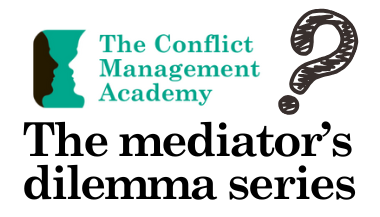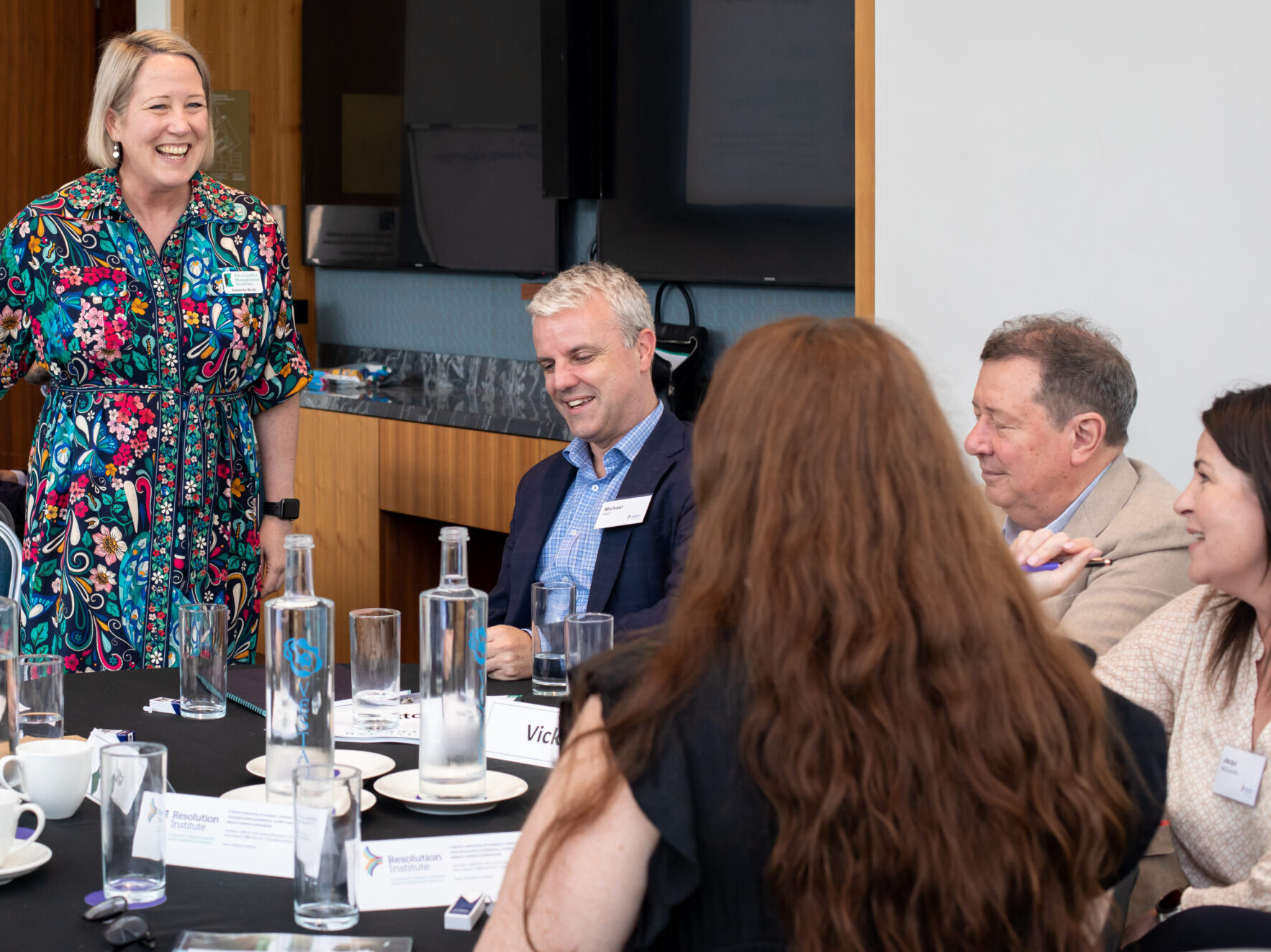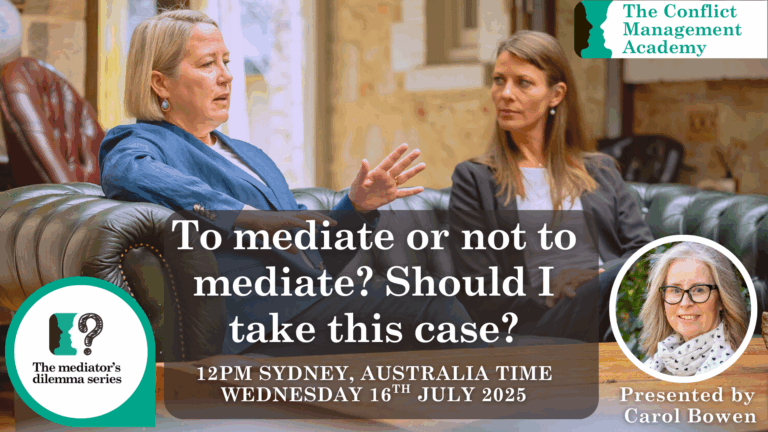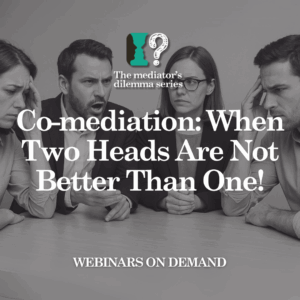
A Thrilling New Event Series for Mediators!
What happens when mediation meets mystery, debate, and high-stakes decision-making? Welcome to The Mediator’s Dilemma, an interactive event series that takes you to the heart of some of the toughest dilemmas mediators face.
Inspired by Geoffrey Robertson’s Hypotheticals, each session immerses you in a fictional yet realistic mediation scenario filled with ethical quandaries, unexpected twists, and moments where the path forward isn’t clear. As the story unfolds, you’ll face the same challenges as the mediator in the story.
Get ready to dive into the messy, fascinating, and rewarding world of mediation like never before.
The dilemmas are real.
The stakes are high.
And the answers?
That’s up to you.

Your role
The facilitator will guide you through the unfolding drama, pausing at critical “dilemma moments” to ask for audience engagement.
Participants will be asked to consider:
- What factors do you see as important in your decision about what to do next?
- What else would you like to know?
- What would you do, and why?
- How would your decision impact the parties / your role as mediator / others?
Why attend?
- Discuss with fellow mediators from diverse backgrounds.
- Challenge assumptions.
- Sharpen your skills.
- Learn from differing perspectives.
- Prepare for real-world practice: Explore dilemmas inspired by actual mediation challenges.
- Engage your mind: Experience a captivating blend of mediation meets reality TV, choose-your-own-adventure, and CSI-type detective work!
- Build community: Connect with peers in a thought-provoking, collaborative environment.
- Have fun: Because learning should be as entertaining as it is enlightening!


Who's it for?
Mediators at all levels—whether you’re stepping into your first session or reflecting on decades of experience, The Mediator’s Dilemma offers something for everyone.
Our next session

To Mediate or Not: Should I Take This Case?
Not every mediation is a good fit—and sometimes the hardest decision is whether to say yes in the first place.
In this next instalment of The Mediator’s Dilemma, we’ll explore real-world scenarios where mediators face tough calls before the process even begins. What do you do when you know one party socially? When there’s a serious power imbalance? When the dispute raises ethical concerns, or touches on your own values?
Join us for an interactive session where we’ll unpack the grey zones mediators navigate in intake and decision-making. You’ll hear from experienced practitioners, test your instincts against the crowd, and reflect on how you assess suitability, safety, and neutrality.
This event will challenge you to consider:
• When should you step back—and when should you step up?
• What do your boundaries say about your practice?
• How do we balance our duty to be accessible with our obligation to do no harm?
Bring your experience, your curiosity, and your judgment—we’ll bring the dilemmas.
Your facilitator for this session - Carol Bowen

Carol (FRIAdvMed, CMC, NMAS) brings a wealth of expertise and knowledge to her conflict resolution practice, with a passion for people and a clear focus on helping client’s deliver required business outcomes when conflicts get in the way of success. Her sense and understanding of human conflict and relationships is very highly regarded by clients and this is reflected in the high degree of success achieved in her mediation, coaching and training engagements.
She has 20 + years of experience as a Conflict Resolution Practitioner. Results-driven, she takes a pragmatic approach, ideally through early intervention as a key conflict resolution strategy with a tailored blend of best practice techniques. Her practice has taken her into the private and public sector within Australia and overseas. This is under-pinned by 25 years of service within the Australian Regular Army which exposed her to plenty of adventures and opportunity, in Australia and overseas, that shaped her as a person and as a professional.
Carol is a Nationally Accredited (Advanced) Mediator, a CINERGY ™ Conflict Management Coach; Mentor and Assessor (Resolution Institute), a Group Facilitator, a Restorative Engagement Facilitator and Coach; an Interactive Problem-Solving Coach and a Conflict Resolution Trainer.
Forthcoming sessions
16 July – Deciding whether to mediate – Carol Bowen
25 August – Power imbalances – Claire Holland
14 October – Power and triangulation – Catherine Davidson
28 November – Responding to escalating behaviour – Carol Bowen
Access recordings of past sessions:

You are mediating what starts out to appear as a typical workplace conflict. But as the mediation progresses, you are increasingly concerned by the behaviour of one of the parties. Things get worse as the mediation continues. The mediation ends, but you can’t sleep that night. What if the worst case scenario happens? Are lives in danger? Is confidentiality more important than your concerns? Should you raise your concerns with the Manager who referred the case? Should you raise your concerns directly with the employer?
In this session you will explore the principle of confidentiality and debate under which circumstances confidentiality may be breached. You will also discuss the concept of “Perceived threat to human life or safety” and how you would determine whether your concerns are justified or not. You will be presented with a few twists in the story to demonstrated how the context may impact your decision.

In a remote mediation office, you’re the sole practitioner navigating a property dispute that seems, at first glance, relatively straightforward. Emily and Michael are back for round two—after a failed attempt at mediation last year, they’re now focused on dividing their assets. With financial disclosures exchanged and a session booked, the process appears smooth—until an unexpected phone call changes everything. It’s a small town. Everyone knows (almost) everything about everyone else. Suddenly you are finding out all sorts of things that seem to change the way this mediation should play out.
In this session you will explore the tension between good faith, fairness and justice, impartiality and confidentiality. What happens when the mediator knows information that one of the parties does not?

Emma and David, co-founders of a high-profile sustainability startup, enter mediation to resolve their deepening dispute. A confidentiality agreement is in place—but things quickly spiral out of control. From secret investor offers and accusations of mediator breaches, to covert recordings, LinkedIn subtext, and workplace gossip, this case throws up real-world dilemmas every mediator could face.
Should the mediator have disclosed more—or less? Is confidentiality a shield, a sword, or something in between? What happens when parties weaponize confidentiality—or claim breaches without evidence?

What happens when the real conflict isn’t just between the parties — but between the mediators themselves?
How do you manage different mediator styles?
What happens when your co-mediator breaches confidentiality?
When should you overtly disagree with your co-mediator for the sake of the parties?
How do you provide constructive feedback for a mediator who doesn’t seem to realise the impact of their approach?
Let the discussions begin!
Annual pass
$299+GST
- Registration for all Mediator's Dilemma sessions (and recordings) for the year.